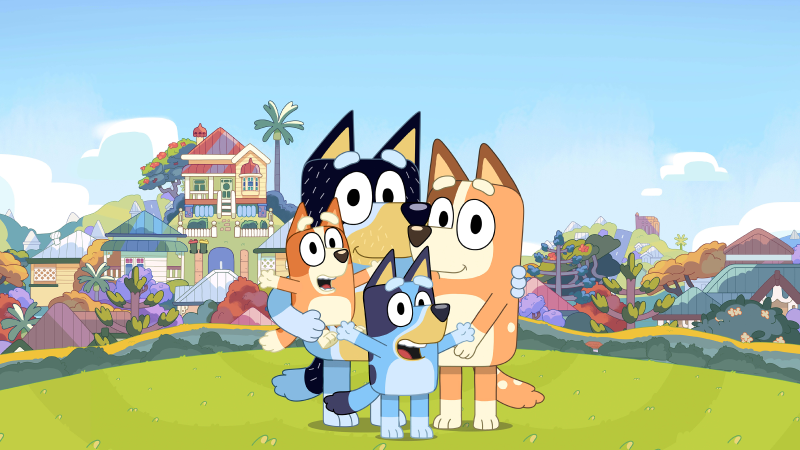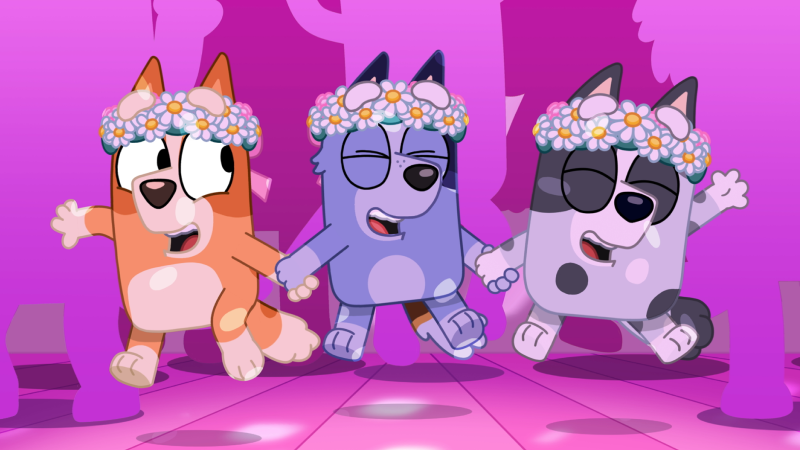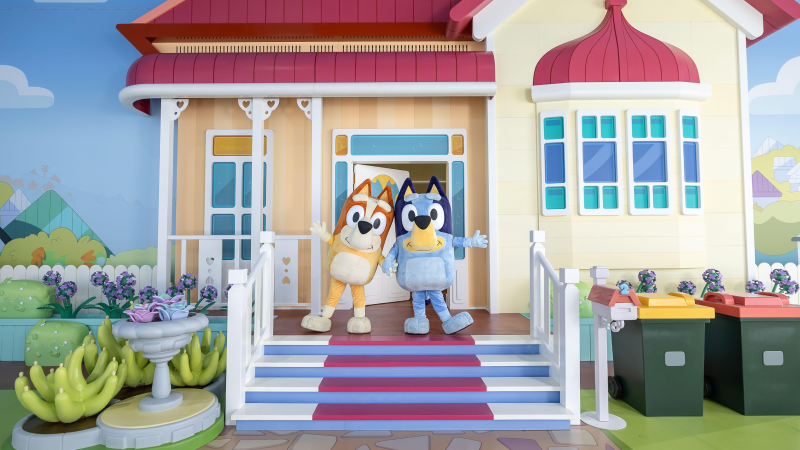The Global Sensation
Commissioned back in 2017 and launched in Australia in 2018, Bluey has now turned into a global phenomenon and must-watch TV for families across the world. In the first half of this year, the show broke yes another record as it became all U.S. household streaming with 25 billion minutes viewed across 154 episodes. Bluey has also won numerous awards like the AACTA Awards, BAFTA Awards, Rockie Awards, Critics’ Choice, International Emmys, Kidscreen, Peabody, etc.
Kelly Wood, Global Content Strategy Director at BBC Studios Kids & Family, tells Yako Molhov which elements of the show turned it into a global success and how they approach the development process and further expansion of the brand, including through the upcoming first Bluey feature film set to be released in 2027.
Kelly Wood, Global Content Strategy Director at BBC Studios Kids & Family, tells Yako Molhov which elements of the show turned it into a global success and how they approach the development process and further expansion of the brand, including through the upcoming first Bluey feature film set to be released in 2027.

Kelly, what is the central, driving philosophy that you believe is key to Bluey’s universal appeal, especially considering its strong co-viewing numbers and popularity among adults without children?
At its heart, Bluey is built on authenticity and emotional truth, drawn from everyday family life. The humor works for kids, but the emotional nuance resonates deeply with adults because it reflects real parenting challenges, joys, and vulnerabilities—not an idealized or sanitized version of family life. It really is ‘for real life’!
Bandit Heeler is often praised as a groundbreaking portrayal of modern fatherhood—playful, emotionally available, and imperfect. Do you think this depiction challenges traditional parenting tropes portrayed in children’s media?
Bandit’s character challenges traditional parenting tropes by showing a father who is playful, emotionally present, and imperfect in a very human way. Unlike many cartoon dads who are either absent, stern, or comic relief, Bandit is fully engaged in his children’s lives. His willingness to play, his occasional fatigue or distraction, and his openness to learn alongside his kids make him both relatable and aspirational. He represents a model of modern fatherhood where vulnerability and fun coexist with responsibility.
Following the monumental success of “The Sign,” which marked a seismic moment for Bluey and her family, how do you intend to approach future storytelling while maintaining the emotional depth and relatability that fans have come to expect?
We see “The Sign” as a proof point that audiences are ready for longer, more ambitious storytelling, but the heart of Bluey will always remain the same: authentic family dynamics and emotional truth. Going forward, the focus is on deepening those everyday moments—finding big feelings in small interactions—while carefully experimenting with format and scale. Whether it’s a minisode or a feature-length story, the goal is to keep the series grounded, relatable, and emotionally resonant, so families everywhere continue to see themselves in Bluey’s world.

Bluey masterfully blends hilarious games like “Keepy Uppy” with subtle, heartfelt moments that often speak to adult experiences. How intentional is this balance, and what do you think it adds to the show’s success across generations?
This balance is carefully considered. On the surface, episodes center on simple games like “Keepy Uppy,” but those games often double as metaphors for bigger themes—resilience, cooperation, problem-solving, or coping with change. By embedding emotional lessons in play, Bluey creates stories that are accessible to kids while carrying deeper meaning for adults. It’s this layering that allows the show to feel light and fun while also driving a deeper emotional connection.
The score by Joff Bush is often described as a character in its own right. How does the music enhance storytelling and contribute to the emotional texture of the series?
Joff Bush’s music is absolutely central to Bluey’s magic—so much so that it often feels like a character in its own right. It’s a storytelling tool that shapes how every episode feels. Each episode’s score is composed to fit its emotional arc, shifting from whimsical to poignant with precision. The music doesn’t just accompany the action; it amplifies it, giving playtime a sense of magic and making emotional beats land even stronger.
Bluey has reset the bar for preschool television in terms of quality and ambition. What impact do you hope the show has on the broader industry, especially regarding trust in creators and investment in high-quality animation?
Bluey has helped redefine what preschool television can be, proving that shows for young children don’t need to compromise on depth, or artistry. Its global success demonstrates the value of trusting creators to tell authentic stories and investing in top-tier animation, writing, and music. The hope is that the industry takes note and recognize that children’s programming can be as emotionally rich and culturally significant as any adult series.
If you could define the ultimate legacy of Bluey—beyond ratings and merchandise—what would you want it to be?
Beyond ratings, awards, or merchandise, one legacy of Bluey would be the way it fosters empathy, imagination, and connection within families and communities. If generations of parents and children look back and say the show helped them play more, listen more, or understand each other better, that would be a true measure of success. Ultimately, the show’s legacy should be measured in moments of shared laughter, resilience, and emotional growth that ripple far beyond the screen.

Are there plans to expand the Bluey franchise further in the future, and if so, what directions are you most excited about exploring?
We very carefully consider everything that we do with Bluey. The guiding principle is to ensure that every new direction feels true to the show’s heart—family, play, and emotional honesty—rather than just brand expansion for its own sake. The next big step is Bluey’s first feature film, slated for release on August 6, 2027. This is so exciting because it brings the show’s heart, humor, and emotional depth to the big screen with creator Joe Brumm at the helm —turning a family outing to the theatre into an event as special as the show itself.
At its heart, Bluey is built on authenticity and emotional truth, drawn from everyday family life. The humor works for kids, but the emotional nuance resonates deeply with adults because it reflects real parenting challenges, joys, and vulnerabilities—not an idealized or sanitized version of family life. It really is ‘for real life’!
Bandit Heeler is often praised as a groundbreaking portrayal of modern fatherhood—playful, emotionally available, and imperfect. Do you think this depiction challenges traditional parenting tropes portrayed in children’s media?
Bandit’s character challenges traditional parenting tropes by showing a father who is playful, emotionally present, and imperfect in a very human way. Unlike many cartoon dads who are either absent, stern, or comic relief, Bandit is fully engaged in his children’s lives. His willingness to play, his occasional fatigue or distraction, and his openness to learn alongside his kids make him both relatable and aspirational. He represents a model of modern fatherhood where vulnerability and fun coexist with responsibility.
Following the monumental success of “The Sign,” which marked a seismic moment for Bluey and her family, how do you intend to approach future storytelling while maintaining the emotional depth and relatability that fans have come to expect?
We see “The Sign” as a proof point that audiences are ready for longer, more ambitious storytelling, but the heart of Bluey will always remain the same: authentic family dynamics and emotional truth. Going forward, the focus is on deepening those everyday moments—finding big feelings in small interactions—while carefully experimenting with format and scale. Whether it’s a minisode or a feature-length story, the goal is to keep the series grounded, relatable, and emotionally resonant, so families everywhere continue to see themselves in Bluey’s world.

Bluey masterfully blends hilarious games like “Keepy Uppy” with subtle, heartfelt moments that often speak to adult experiences. How intentional is this balance, and what do you think it adds to the show’s success across generations?
This balance is carefully considered. On the surface, episodes center on simple games like “Keepy Uppy,” but those games often double as metaphors for bigger themes—resilience, cooperation, problem-solving, or coping with change. By embedding emotional lessons in play, Bluey creates stories that are accessible to kids while carrying deeper meaning for adults. It’s this layering that allows the show to feel light and fun while also driving a deeper emotional connection.
The score by Joff Bush is often described as a character in its own right. How does the music enhance storytelling and contribute to the emotional texture of the series?
Joff Bush’s music is absolutely central to Bluey’s magic—so much so that it often feels like a character in its own right. It’s a storytelling tool that shapes how every episode feels. Each episode’s score is composed to fit its emotional arc, shifting from whimsical to poignant with precision. The music doesn’t just accompany the action; it amplifies it, giving playtime a sense of magic and making emotional beats land even stronger.
Bluey has reset the bar for preschool television in terms of quality and ambition. What impact do you hope the show has on the broader industry, especially regarding trust in creators and investment in high-quality animation?
Bluey has helped redefine what preschool television can be, proving that shows for young children don’t need to compromise on depth, or artistry. Its global success demonstrates the value of trusting creators to tell authentic stories and investing in top-tier animation, writing, and music. The hope is that the industry takes note and recognize that children’s programming can be as emotionally rich and culturally significant as any adult series.
If you could define the ultimate legacy of Bluey—beyond ratings and merchandise—what would you want it to be?
Beyond ratings, awards, or merchandise, one legacy of Bluey would be the way it fosters empathy, imagination, and connection within families and communities. If generations of parents and children look back and say the show helped them play more, listen more, or understand each other better, that would be a true measure of success. Ultimately, the show’s legacy should be measured in moments of shared laughter, resilience, and emotional growth that ripple far beyond the screen.

Are there plans to expand the Bluey franchise further in the future, and if so, what directions are you most excited about exploring?
We very carefully consider everything that we do with Bluey. The guiding principle is to ensure that every new direction feels true to the show’s heart—family, play, and emotional honesty—rather than just brand expansion for its own sake. The next big step is Bluey’s first feature film, slated for release on August 6, 2027. This is so exciting because it brings the show’s heart, humor, and emotional depth to the big screen with creator Joe Brumm at the helm —turning a family outing to the theatre into an event as special as the show itself.









































